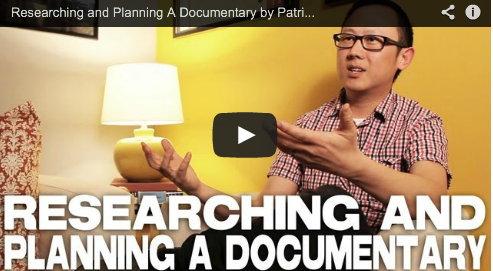
PATRICK SHEN – DIRECTOR/FOUNDER OF TRANSCENDENTAL MEDIA
The moral and social dilemmas journalists face have long been debated. Kevin Carter the photographer who committed suicide after winning the Pulitzer Prize for his famous photo of a vulture hovering over a starving child in Sudan, is perhaps the most extreme and well-known example of how complicated and tragic this dilemma can be for some. At the crux of this dilemma is the relationship between our obligation to the truth, to the issues we shed light on, and the subjects we employ to tell our stories. Can an honest relationship with all of those things co-exist within the same filmmaker? I think it must if we are to keep the medium honest and the process pure.

When armed with a camera, are we humans first or filmmakers first? How can the lessons we’ve gained from life help us make better films and how can making better films make us better people? With the rise of social issue documentary filmmaking, more filmmakers are finding themselves in moral and social grey areas. I’ve built my company Transcendental Media on the principle of making films “to agitate the sleep of mankind” and in my travels making documentaries over the last decade I’ve often toiled with these ideas myself and while I don’t consider myself an expert on the issue, I may be able to shed some light on how we might maintain our humanity while keeping the cameras rolling.

As many of us who have made a few films have learned, filmmaking, specifically documentary filmmaking, is more than just the technical process of capturing a subject’s movements and actions but more of a social interaction between the human(s) behind the camera and what is happening in front of the camera. Along with the social dynamics comes a set of rules that if adhered to or not can determine whether the exchange is a successful one or a disastrous one. Navigating the challenging landscape of human dynamics is at the core of being human. An intimate exchange with someone with whom we truly relate can alter the trajectory of our day – in some cases, even our lives – as can an awkward or tense exchange with someone.
(Watch the video interview here on Youtube)

Between your interactions with your crew and your subjects to name just two areas in which it’s important, consider all of the situations you find yourself in as a filmmaker in which dynamics play such a significant role. We’ve all experienced the affects of bad blood on set. It’s not pretty as I’m sure Lily Tomlin or David Russell will tell you from their experiences on the set of “I Heart Huckabees”. To ignore or overlook the importance of interpersonal dynamics in the filmmaking process is to ignore the very essence of what makes a good filmmaker. Gaining a better understanding of this will not only make us better filmmakers and give us a more three-dimensional comprehension of our characters and subjects, but it will ultimately make us better and more informed people.
Be human, just keep the camera rolling.
In their purest form, documentary filmmakers are in the business of truth. Documenting reality and revealing truths about the world requires that we also are truthful in our approach. Sure, there are cases where it might be advantageous to the film, and therefore the truth that you’re intending to reveal, to withhold certain information (that you may have been privy to for whatever reason) from your subject so long as it doesn’t cause any real harm. That’s understandable. The bottom line is: if your subject doesn’t trust you or feel better about themselves when they’re around you, they won’t let you in. If they don’t let you in, your film will likely suffer and lack the dimension and intimacy that most documentary filmmakers are trying to achieve in their films.

From a social standpoint, making documentaries is a lot like navigating our relationships outside of our filmmaking lives. Much like how sincere people tend to bring out sincerity in others, sincere filmmakers tend to bring out sincerity from their subjects. Your film not only benefits from this, but more importantly, humanity benefits. The sooner we embrace the social aspects of being a documentary filmmaker, the sooner we’ll be able to start making films with more depth and intimacy. It’s also important to remember that much like being human is forever a work-in-progress so is our growth as filmmakers. Dynamics are never perfect and neither are our efforts to manage them.
Extracting Truth from Your Subjects.
In the typical trajectory of a relationship with the people in our lives, trust-building often takes place over many weeks, months, or years. A filmmaker might find herself having to build trust with her subjects quickly, sometimes within minutes, and under circumstances that are less than ideal. It’s not always possible to achieve, even for experienced filmmakers, but it can often mean the difference between a successful shoot or film and a disastrous one. There is no formula that I’m aware of that can be applied across the board in every situation, but I think there are several key things that are important to be mindful of:
1) Subjects are much more willing to let you in when they are feeling confident about themselves and their involvement in your project. Most subjects become very nervous and begin to monitor their behavior to a point where it can paralyze them or cause them to hold back from being real with you. Being genuinely humble, respectful, and complimentary helps put the subject at ease.
2) It’s more difficult for the subject to forget the camera is there when it’s in their face. Whenever possible, keep a safe distance away from the subject and zoom in to compensate for the distance if possible.
3) If the subject has never been in a film before, it’s likely they will not have any clue as to what to expect and what to do. This will make them nervous. Setting expectations and guidelines, if any, before you begin filming is a good way to put them at ease.
4) Do not treat them like a subject. Make an effort to remember their name and use it as often as possible. Befriend them in a genuine way.
5) It might seem counter to the above, but when the camera starts rolling, unless you’re interviewing them, stop interacting with them and try not to make eye contact or they’ll instinctively start talking to you.
6) Sometimes the subject will say something or do something that embarrasses them or maybe reflects poorly on them. If you’ve done your job, they’ve forgotten you’re there, but if not, you might need to do some work to put them at ease.
7) Lastly, don’t think too much. Good filmmaking requires trusting yourself and your instincts, too.

Patrick Shen is a multiple award-winning director and founder of Transcendental Media. Before directing and producing feature films Patrick produced over a dozen films for non-profit organizations, worked on various Emmy-award winning TV shows at E! Networks and ESPN, and served as 2nd Unit Director on the Emmy-nominated PBS documentary “We Served With Pride” which earned him an invite to the White House to meet with President Clinton. Patrick served as director, producer, and editor on TM releases “Flight from Death,” “The Philosopher Kings,” and the soon-to-be released “La Source,” a feature documentary about one man’s dream to bring clean water to his village in Haiti. He is currently in pre-production on a new feature documentary, set to be filmed in China, in partnership with the Center for Asian American Media called “The Art of Work” which will examine humanity’s relationship with work. For more information on Patrick, please visit Transcendfilms.com.
Check out more great content on Film Courage
from Patrick Shen:
Patrick’s Film Courage article MAKING YOUR FILM MATTER: AN INTRODUCTION TO SOCIAL ACTION CAMPAIGNS
Outside-The-Film Courage-Studio (video) interview with Patrick Shen and Brandon Vedder
Patrick Shen and Brandon Vedder give us their take on rushing to meet a festival deadline, how they recharge their energy, and their film La Source.
IN PURSUIT OF SILENCE: A documentary exploring the value of silence, our relationship with sound, and the implications of living in a noisy world.
CONNECT WITH PATRICK
Patrickshen.com
IMDB
Lasourcemovie.com
Facebook
Twitter
Check out Patrick’s new successfully crowdfunded film
IN PURSUIT OF SILENCE: A documentary exploring the value of silence, our relationship with sound, and the implications of living in a noisy world.
Advertisement

Batman fans! Watch the campaign video here on GoFundMe and check out the story behind the music from the 1966 “Batman” Television Series
THE BEAT OF THE BAT is a full-length documentary that tells the story of the music of the 1966 “Batman” Television Series and how composers Neal Hefti, Nelson Riddle & Billy May gave Batman his first real musical identity- and one that has remained inexorably tied to the character for over 50 years!
In fact, if you saw the just released “Lego Batman Movie” you might have noticed the numerous references to the music of the TV series.
And face it, you can go up to anyone, anywhere in the world and sing “Na Na Na Na Na Na Na Na!” and they will instantly know what you are talking about!
The music was as important to the show as the bright colors, campy dialogue and tongue-in-cheek performances. Yet, strangely, the story of how it came to be has never been told… Until now.

Watch EXODUS on iTunes starting April 18th, 2017
EXODUS documents the journey of Syrian refugees as they cross the Aegean Sea from Turkey into Greece. In the winter of 2015, over three thousand refugees attempted this treacherous crossing everyday, all in hope of seeking asylum in the European Union. It’s a life and death gamble that they are willing to take, all for a chance at a new life away from their war-torn homeland.

Watch FREAK OUT on iTunes here!
FREAK OUT: Matan, a soldier in the IDF, sets off for a week of patrolling in a remote base in the north of Israel with three soldiers whom he doesn’t know. As the week progresses, the soldiers begin to question whether they will come out of this experience alive.

Watch THE HOLLY KANE EXPERIMENT on iTunes here!
THE HOLLY KANE EXPERIMENT: An obsessive psychologist attempts to reprogram her subconscious mind, but when her actions become increasingly uncharacteristic she fears her experiment is dangerously out of control.

Watch the video here about filmmaker Roee Messinger and his desire to create this powerful documentary film
AMERICAN TRIAL seeks to discover what a trial in the Eric Garner case might have taught us. How is our legal system designed to handle cases such as Garner’s? What verdict may have been returned after all the evidence was presented? More importantly, what conversations, perspectives and emotions went unexamined because of the grand jury’s decision?
Similarly to fiction courtroom dramas, the lead characters of this documentary will be the attorneys leading the prosecution and the defense. Our camera will capture them as they develop their public arguments and individual positions. How do they decide which witnesses to summon? How do they prepare for their court appearance? Are there any discrepancies between their systemic role and their true feelings regarding the case?
The film will also follow a news crews covering the trial and reporting on race relations in America within the context of the trial and the movement for black lives. They will travel across America to discover what public figures, intellectuals and activists think about the Eric Garner case, as well as other similar cases through the prism of racial relations in the United States.





























